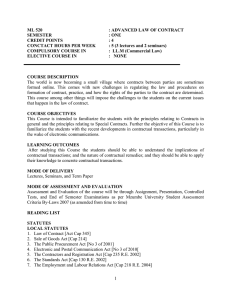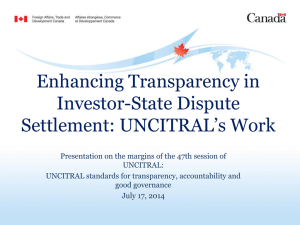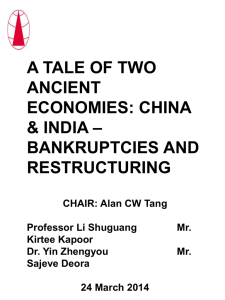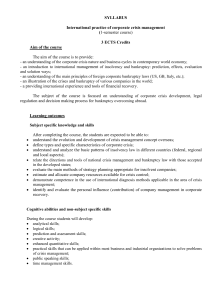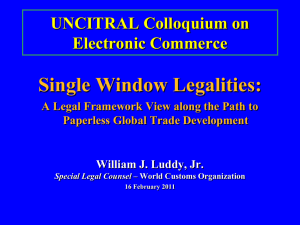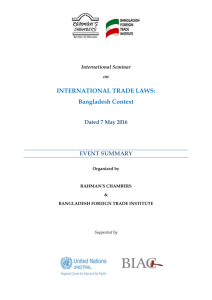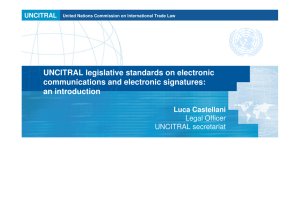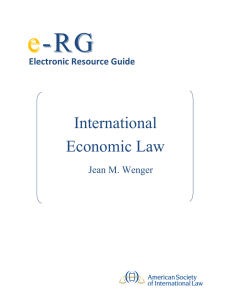Expert Meeting on CYBERLAWS AND REGULATIONS FOR ENHANCING E-COMMERCE:
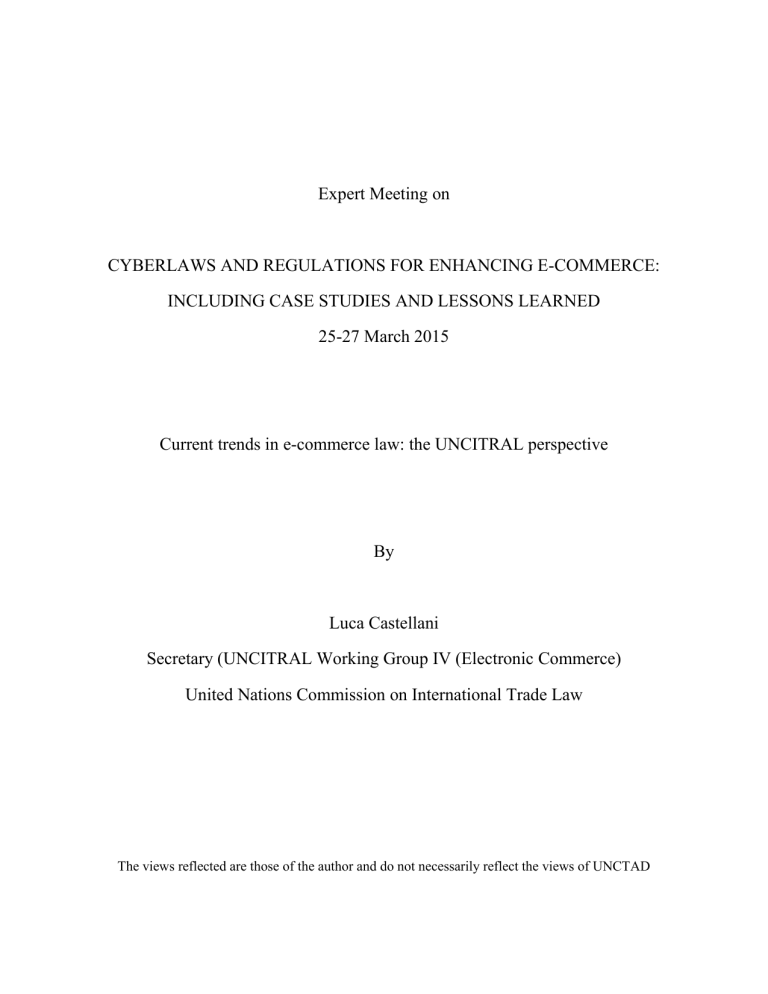
Expert Meeting on
CYBERLAWS AND REGULATIONS FOR ENHANCING E-COMMERCE:
INCLUDING CASE STUDIES AND LESSONS LEARNED
25-27 March 2015
Current trends in e-commerce law: the UNCITRAL perspective
By
Luca Castellani
Secretary (UNCITRAL Working Group IV (Electronic Commerce)
United Nations Commission on International Trade Law
The views reflected are those of the author and do not necessarily reflect the views of UNCTAD
UNCITRAL
United Nations Commission on International Trade Law
Current trends in e-commerce law: the UNCITRAL perspective
Luca Castellani
Secretary, UNCITRAL Working Group IV
(Electronic Commerce)
Enabling ICT use to promote economic development
• Overarching goal: promoting economic development in line with globalisation’s requirements
• Use of ICT is the result of policy choices, legal reform and technical implementation
– Are achievements taking place fast enough?
• Clear need to establish a legal framework enabling the use of ICT to transfer goods, services and funds
– Nationally and internationally
UNCITRAL
United Nations Commission on International Trade Law
Law of e-transactions and e-signatures: current status
• Legal harmonisation has made good progress, but is not yet universal
– Significant differences among regions and legal traditions
• Issues with use of PKI for signatures
– Technical challenges in implementation in developing countries;
– Obstacle to cross-border recognition of electronic signatures;
– Technology neutrality, especially for e-signatures, is being pursued also in Free Trade Agreements.
UNCITRAL
United Nations Commission on International Trade Law
Law of e-transactions and e-signatures: e-CC contribution to harmonisation
• UN Electronic Communications Convention (e-CC) offers:
– higher level of uniformity;
– cross-border “legal interoperability”, including recognition of electronic signatures in B2B exchanges;
– and much more.
• Has the e-CC delivered?
– 18 signatories, 6 States parties (more forthcoming);
– but 10+ States enacted provisions domestically.
• Need to adopt text as a treaty to enjoy its benefits in full.
UNCITRAL
United Nations Commission on International Trade Law
Law of e-transactions: electronic transferable records
• Electronic transferable records not yet widely used.
• More guidance needed on details of ETR legislation as few examples exist.
• On-going work of UNCITRAL Working Group IV
– Possible first outcome in form of a model law.
• This may lead to full dematerialisation of all commercial documents, including bills of lading (and letters of credit).
• Developing countries are adopting laws on electronic warehouse receipts
– but are not yet fully aware of the relevance of this
UNCITRAL project.
UNCITRAL
United Nations Commission on International Trade Law
Legal issues in single window facilities: current status
• SW are largely hailed as pivotal in paperless trade implementation, but:
– Have piecemeal implementation;
– Do not operate across borders;
– Legal issues are often overlooked.
• One major challenge is the “B2G legal divide”
– E-Government legislation not always aligned with
B2B E-Commerce legislation;
– Prevents submission of high quality data.
• Ongoing work stemming from UN ESCAP Resolution
68/3: “Enabling paperless trade”.
UNCITRAL
United Nations Commission on International Trade Law
Other issues on the UNCITRAL agenda
• Identity Management
– Seen also as evolution of e-signatures;
– Technical model not ready, legislation premature?
• M-Commerce
– Limited number of legal challenges;
– But strong demand for guidance on M-Payments
• Broader need for E-payments laws taking into account the use of third party platforms.
• Cloud Computing
– Much attention, but significant regional differences, e.g. with respect to privacy and data protection;
– Scope of work might be limited to contractual practices.
UNCITRAL
United Nations Commission on International Trade Law

